Social Awareness Teaching Resources
Help your students build social awareness skills with activities and printables, social skills worksheets and more SEL teaching resources created by teachers specifically for primary school students.
This collection is full of digital and printable activities created by the expert teachers of the Teach Starter team to help teachers as they work with students on being more socially aware, recognise social cues, understand social dynamics and treat the people around them with kindness and courtesy.
Each teaching resource in this social awareness teaching resource collection has undergone rigorous review by the Teach Starter team to ensure it's ready for the classroom ... and your students!
Curious about teaching social awareness and wondering how to build students' social skills? Read on for some tips from our expert teachers!
What Is Social Awareness? A Kid-Friendly Definition
Being socially aware is not something that comes naturally to every child, and explaining what social awareness means can be tough. Our teacher team has created this kid-friendly definition to help!
Social awareness is understanding how other people feel and what they need. When we are socially aware, we notice how others are doing, and we make an effort to be kind and helpful to them.
Social awareness also means paying attention to the rules and ways people behave in different situations.
Being socially aware means we are more sensitive to the feelings of people around us, and we can then use our social skills — such as the ability to be kind, to listen and to cooperate – to work with others. It means we can empathise with others, understand diverse perspectives and navigate social interactions effectively.
Social Awareness Examples for Kids
Now that you've explained the social awareness meaning, it helps to explore what it actually looks like when you put it into practice. Many of your students may have at least some skills already at hand — depending on the individual student and grade level.
A student in pre, for example, may show empathy by giving a crying friend a hug or sharing a toy, but they're typically not yet able to understand that people have different perspectives.
So how can your students show they're socially aware? Let's look at some kid-friendly social awareness examples!
- Taking turns on the playground or the tuckshop.
- Sharing crayons or gluesticks with classmates.
- Making eye contact with friends when they're speaking.
- Paying attention when a teacher is speaking and not interrupting.
- Collaborating with classmates to complete a group assignment.
- Using conflict resolution skills to address issues with a friend.
- Offering to help the PE teacher put away the netball equipment or helping the teacher librarian shelve the books that have been left out by other students.
What Is the Difference Between Self Awareness and Social Awareness?
We teach students both self awareness and social awareness in primary school, and the two relate to one another as important aspects of emotional intelligence.
But where social awareness is focused outward on the emotions, perspectives and needs of others, self awareness focuses inward on recognizing those concepts in oneself.
Social Awareness and Emotional Intelligence
Emotional intelligence is an umbrella term that involves a number of the core components of a social emotional learning curriculum — including self awareness, self management and relationship management, as well as social awareness.
So how does social awareness specifically tie back to emotional intelligence? Being emotionally intelligent involves not just recognising emotions in one's self but in others — the basic component of social awareness for our students.
Take social dynamics, for example. Understanding the social dynamics at play in a particular situation is a big part of being socially aware. Recognising group norms, cultural differences and power dynamics all help our students to avoid causing offense or discomfort in others. It's a great example of having the emotional intelligence required to navigate a situation!
What Are Social Skills?
Social skills is a pretty broad term, but it essentially refers to the ability of our students to interact effectively and appropriately with others in a variety of social situations.
The skills we focus on in pimary school include being able to communicate effectively, both verbally and non-verbally, as well as being able to understand and interpret the social cues and behaviours of others.
What Are Some Examples of Social Skills?
When we're talking about the social skills and relationship skills that kids develop under our watch, the list is long, but here are just a few examples of the social skills that are important for young students to work on:
- Communication Skills — Being able to express themselves clearly and effectively — both verbally and non-verbally — is an important social skill for kids to develop. At this age, students are capable of learning how to use appropriate verbal language, tone and body language — all part of relating to you as a teacher, to their classmates and to their family at home too.
- Active Listening — Learning how to listen attentively to others and understand their perspectives is another social skill that's age-appropriate and you'll likely cover extensively, regardless of the grade you're teaching. Primary students can learn how to appropriately ask questions and provide verbal and non-verbal feedback — both key to learning as a general life skill and in the classroom.
- Empathy — Teaching our students to understand and appreciate the feelings and perspectives of others is another important social skill and one students often need modelling to develop. This covers learning how to put themselves in other people's shoes and respond appropriately to their emotions.
- Problem-Solving and Conflict Resolution — Kids need to learn how to identify and resolve conflicts in healthy and effective ways as they grow up, and their relationships with classmates play a big role in building those skills. Both in class and on the playground, your students will be learning how to negotiate, compromise and find common ground with others.
- Self-Regulation — Our students should learn how to manage their emotions, thoughts and behaviour in different social situations. Learning how to control impulses, stay calm and think before acting will serve them long after graduating.
- Teamwork — Kids need to learn how to work effectively with others in a group setting, and the group activities you do in the classroom can help build this social skill. This basic skill covers learning how to share, take turns, and cooperate with others — something that will once again serve them far into their futures.
- Respect — Our students should learn to treat others respectfully, regardless of their differences. This is part of building a safe classroom environment. These lessons should focus on using appropriate language, avoiding stereotypes and appreciating diversity.
These various social skills are important for our students in the classroom, and they will extend far beyond as they grow up, serving them in a personal setting and eventually a professional one, too, as they forge new relationships.
How to Develop and Improve Social Skills for Kids
There is no magic spell when it comes to social skills! Kids' social skills improve through socialising with others and explicit instruction.
Here are a few of the ways that those skills can be developed (and improved!):
- Play — For kids, playing with peers is a major component of developing relationship skills as they interact with other kids and learn some of society's unwritten rules of socialisation.
- Modelling — We know that children learn by observing the behaviour of the people around them, and this applies to relationship skills as well. Kids pick up social cues and learn how to respond by watching how others — including their teachers — interact.
- Communication — Those speaking and listening skills we work on in the classroom are essential for social interaction. Children can learn to communicate their needs and feelings and understand and respond to the needs and feelings of others when you work on these important skills.
- Positive Reinforcement — Encouraging students to treat others with kindness and respect, then positively reinforcing these behaviours are both important for building confidence and self-esteem. In turn, children who feel good about themselves are more likely to interact socially and develop positive relationships with others.
- Group Activities — Group work and group projects provide our students with opportunities to work together and practise cooperation and collaboration.
- Plus Plan
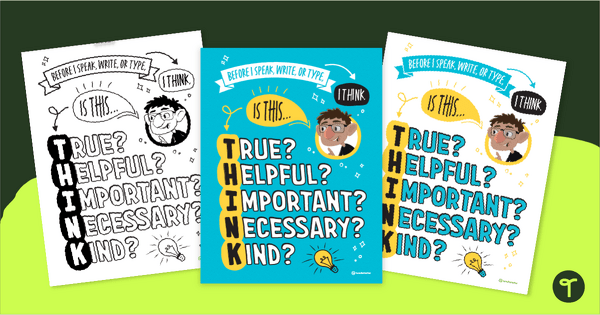
THINK Strategy - Think Before You Speak Poster
Promote positive communication using the THINK strategy and our printable Think Before You Speak Poster.
- Plus Plan
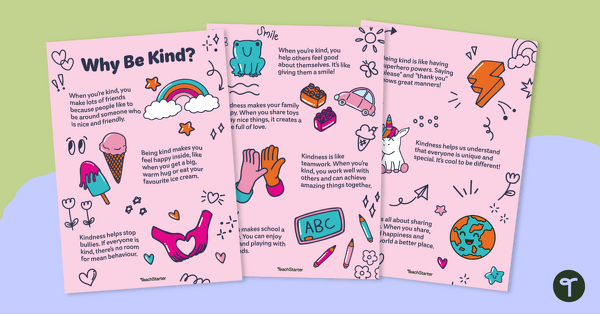
Why Be Kind Classroom Posters
Display this gorgeous set of kindness posters to teach students why kindness matters.
- Free Plan
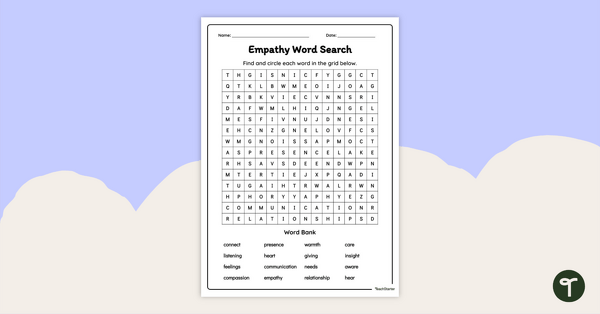
Empathy Word Search
Introduce or review vocabulary terms related to empathy with this free word search worksheet.
- Free Plan
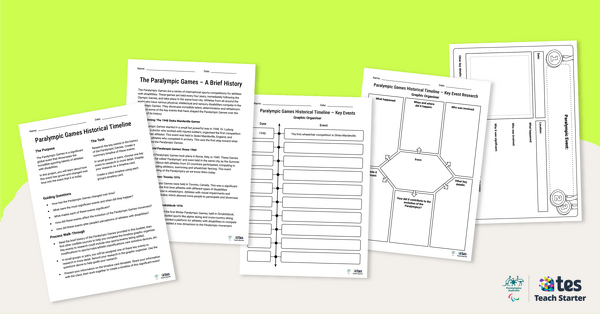
Paralympic Games Historical Timeline – Inquiry-Based Project
Introduce your students to the rich history of the Paralympic Games with this inquiry-based learning project.
- Free Plan
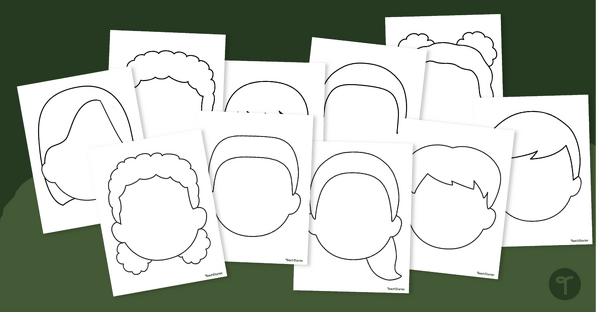
Free Blank Face Template Pack
Use these free blank face templates to create fun back-to-school art celebrating the individuality and diversity of your new students!
- Plus Plan
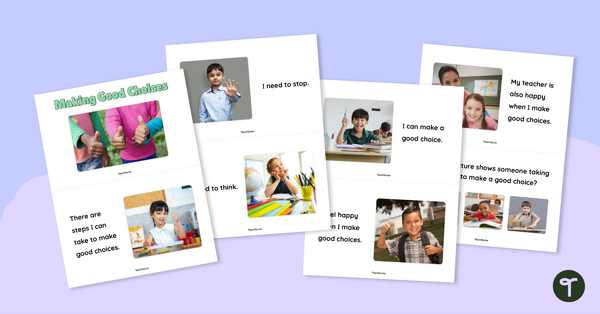
Making Good Choices Mini-Book
Help your students develop strategies for making good choices with this printable social story mini-book.
- Free Plan
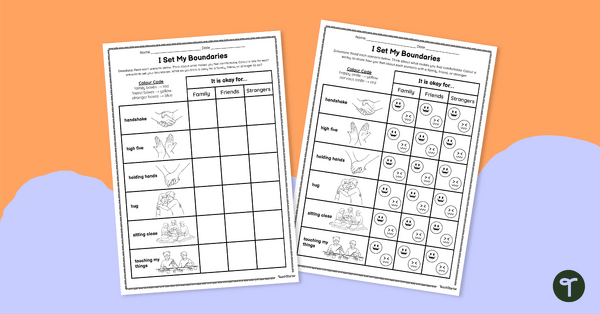
I Set My Boundaries Worksheets
Identify your personal space boundaries with this worksheet set.
- Plus Plan
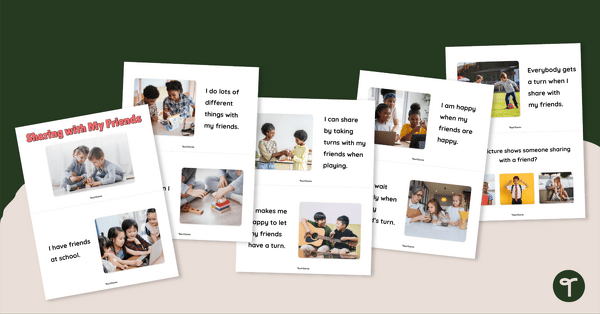
Sharing with My Friends – Mini-Book
Develop skills and strategies for sharing with others with this printable mini-book.
- Plus Plan
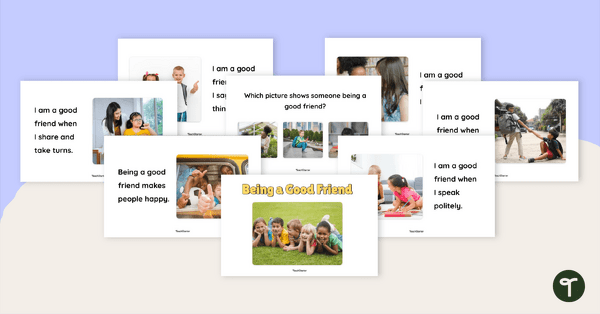
Being a Good Friend – Mini-Book
A social story to develop social skills for being a good friend.
- Plus Plan
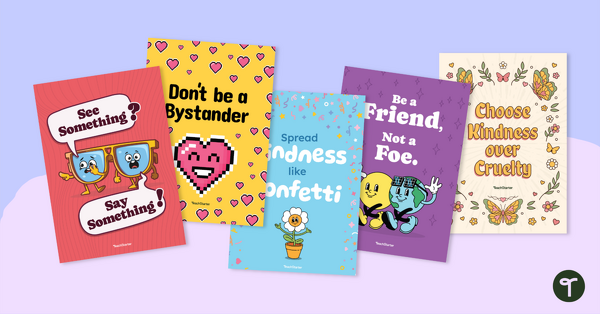
Printable Anti Bullying Posters
Decorate your classroom and school during Anti-Bullying Week with printable Anti-Bullying Posters!
- Plus Plan
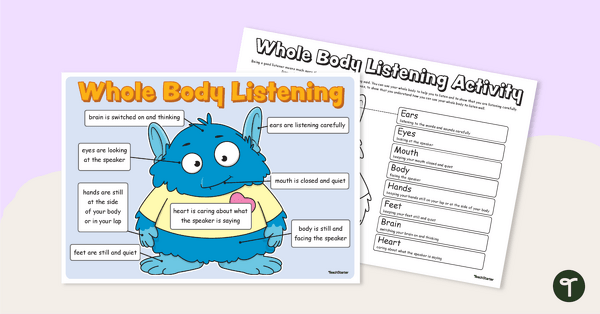
Whole Body Listening – Poster and Worksheet
Use this poster and accompanying worksheet to teach your students about whole body listening.
- Plus Plan
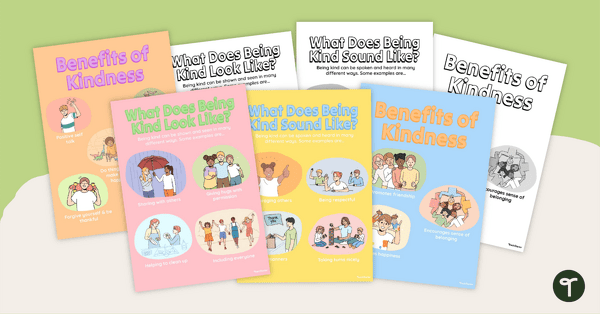
Kindness Poster Set
Display this set of kindness posters in your classroom to help your students understand the power of being kind.
- Plus Plan
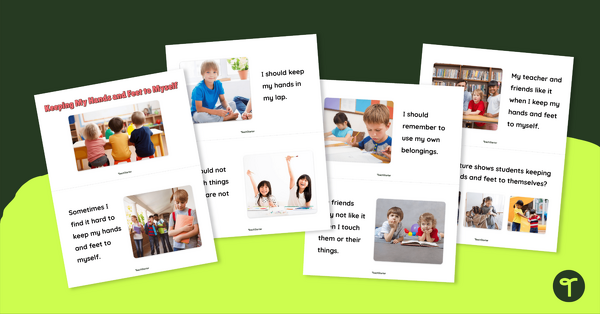
Keeping My Hands and Feet to Myself Mini-Book
Teach your students about the importance of keeping their hands and feet to themselves with this printable mini-book.
- Free Plan
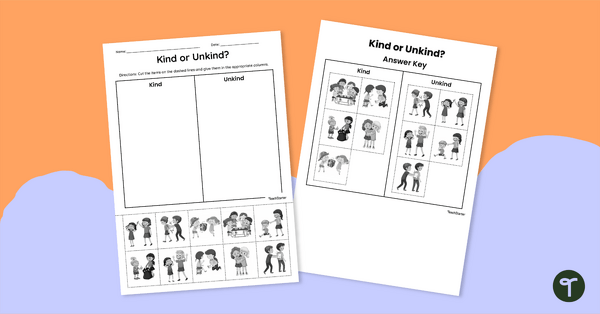
Kind or Unkind Cut-and-Paste Worksheet
Explore kind and unkind scenarios with your students using this engaging cut-and-paste worksheet.
- Plus Plan
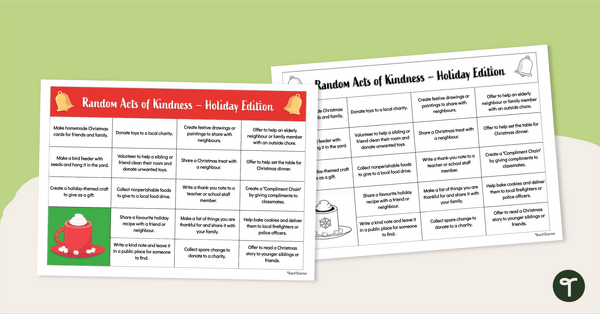
Christmas Random Acts of Kindness Calendar
Inspire Random Acts of Kindness this holiday season with a printable Christmas Kindness Calendar.
- Plus Plan
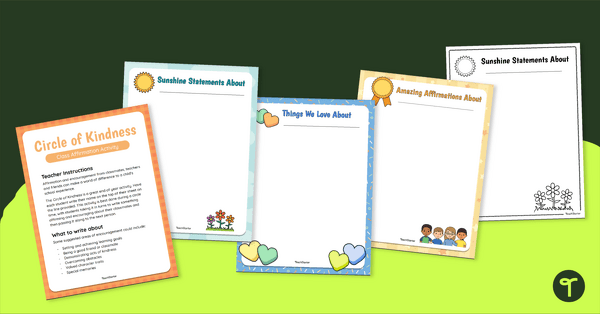
Circle of Kindness Templates
End the school year with individual affirmations for kids with our Circle of Kindness affirmation activity.
- Plus Plan
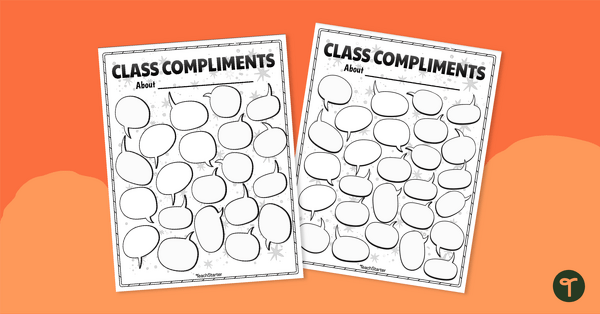
Class Compliments - SEL Worksheets
Encourage kindness and boost morale by creating a wall of compliments for each student with a printable self-esteem activity.
- Plus Plan
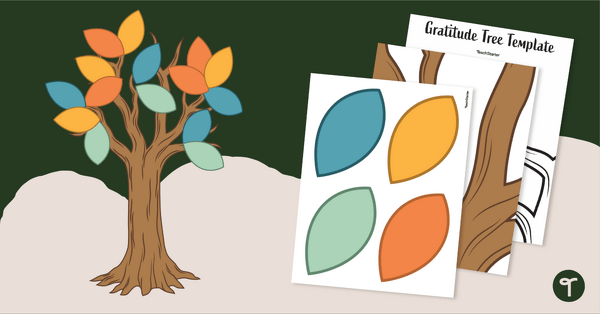
Gratitude Tree and Leaves Template
Create a gratitude tree display with a printable tree and leaves template.
- Plus Plan
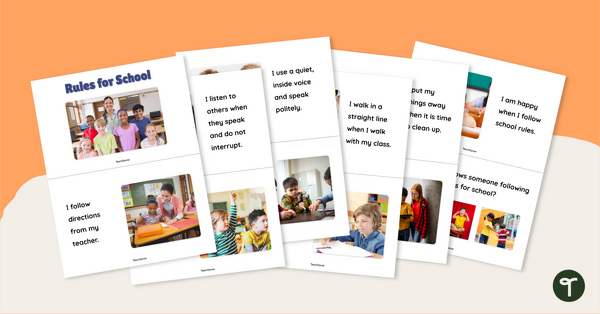
Rules for School Mini-Book
Remind students about appropriate behaviours at school with this printable mini-book.
- Plus Plan
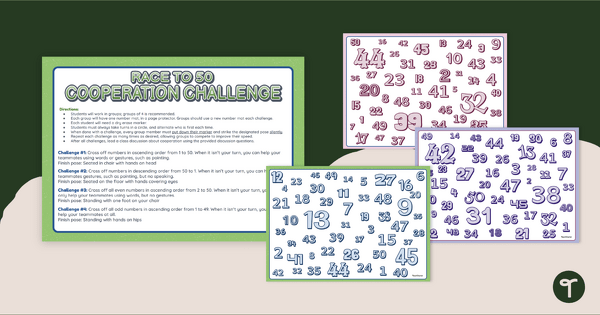
Race to 50: Cooperation Challenges
Explore the benefits of cooperation with a set of team-building number race activities.
- Plus Plan
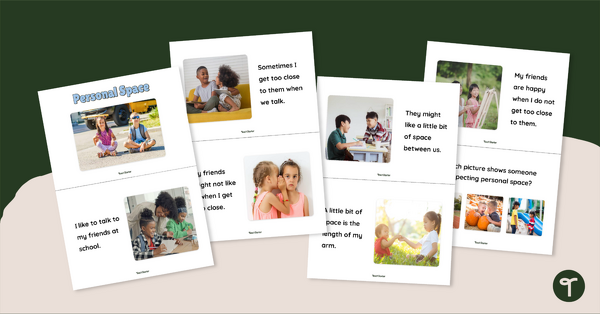
Social Stories - Personal Space
Learn about the importance of leaving personal space when interacting with others with this personal space social story.
- Plus Plan
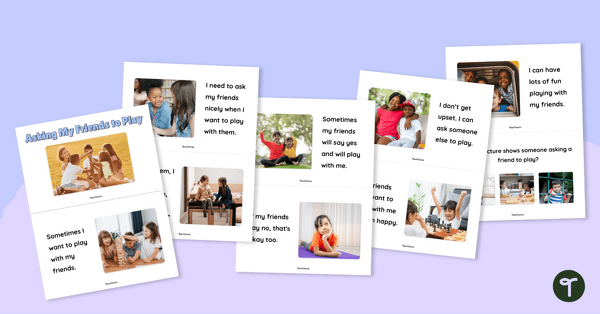
Asking My Friends to Play Mini-Book
Learn about appropriate social skills when asking friends to play with this printable mini-book.
- Plus Plan
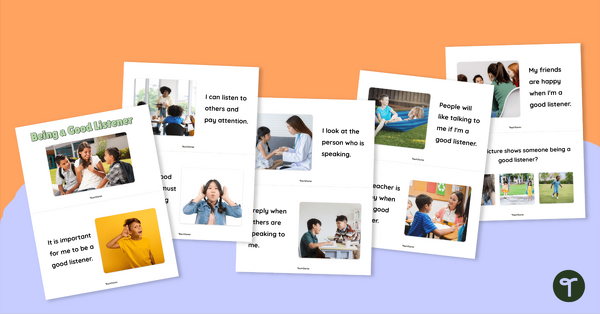
Being a Good Listener Mini-Book
Develop and reinforce appropriate listening skills with this printable social skills mini-book.
- Plus Plan
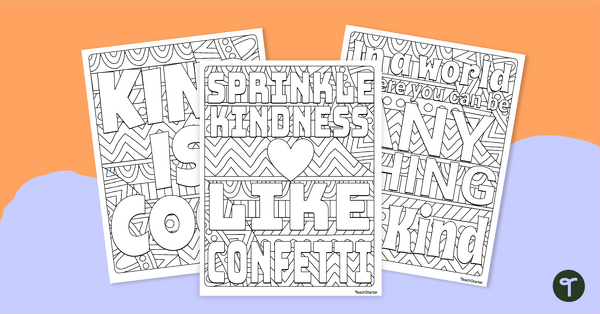
World Kindness Day Colouring Sheets
Use these World Kindness Day colouring pages as a fun art activity with your students.
- Plus Plan
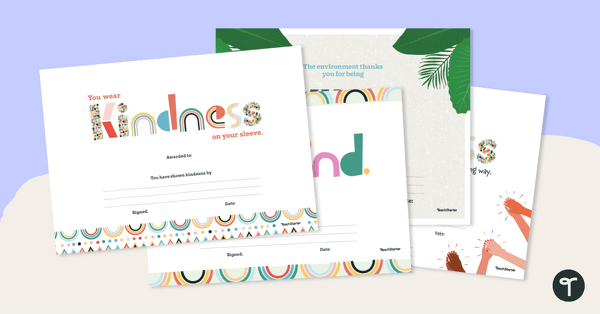
Kindness Award Pack
Reward kindness with five styles of certificates that celebrate thoughtful acts among your students and the environment.
- Free Plan
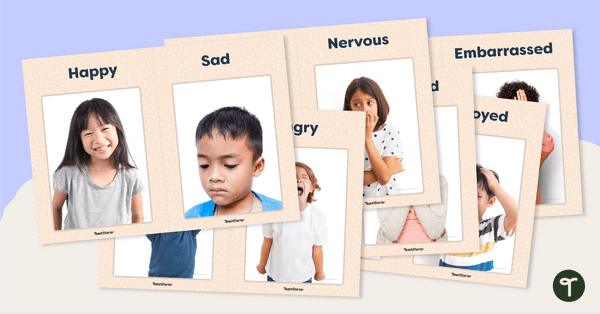
Recognising Feelings Flashcards
Improve your students' emotional literacy with this set of feelings flashcards.
- Plus Plan
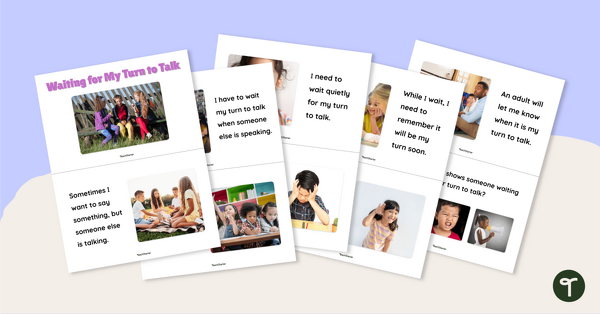
Waiting for My Turn To Talk Mini-Book
Help students develop efficient strategies when waiting for their turn to talk with this social story mini-book.
- Plus Plan
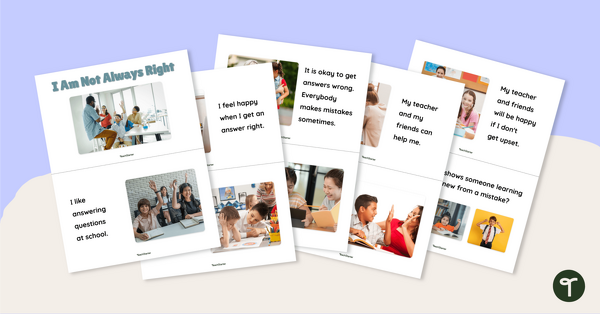
I Am Not Always Right Mini-Book
Help your students learn how to cope when they make a mistake with this social story mini-book.
- Plus Plan
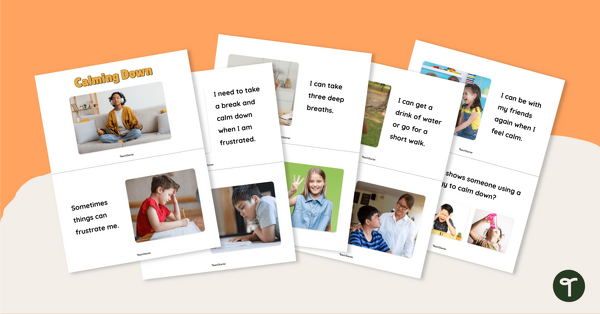
Calming Down Mini-Book
Help your students to keep calm when they are experiencing heightened emotions with this social story mini-book.
- Plus Plan
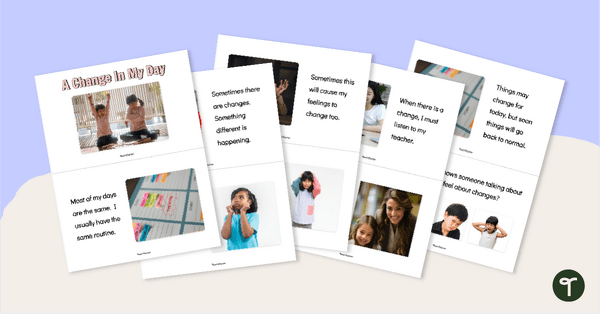
Coping With Change - Social Story Mini Book
A social story to develop coping skills for when there is a change in the routine.
- Plus Plan
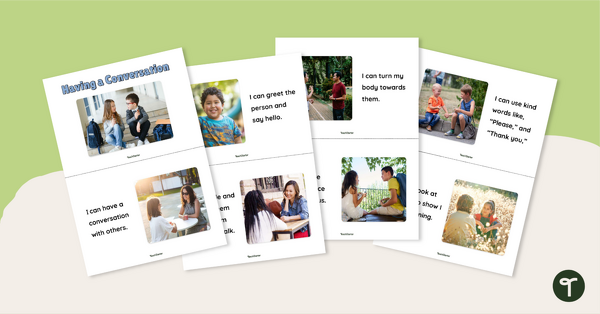
Having a Conversation Social Story
Build confidence in your students by using this Conversation Skills Social Story printable booklet.
- Plus Plan
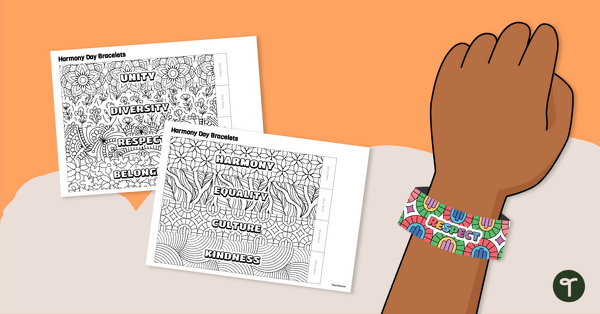
Printable Harmony Day Bracelets
Celebrate diversity and inclusion by having your students create their own Harmony Day bracelets with mindful colouring and meaningful words that reflect the spirit of the holiday.
- Social Awareness Posters
- Social Awareness Templates
- Social Awareness Worksheets
- Social Awareness Games
- Social Awareness for Preschool/Kindergarten
- Social Awareness for Foundation Year
- Social Awareness for Year 1
- Social Awareness for Year 2
- Social Awareness for Year 3
- Social Awareness for Year 4
- Social Awareness for Year 5
- Social Awareness for Year 6